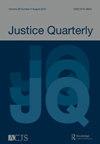评估公众对刑事定罪附带后果和其他后果的支持
IF 2.6
1区 社会学
Q1 CRIMINOLOGY & PENOLOGY
引用次数: 2
摘要
随着人们越来越认识到过度刑事处罚的局限性,学者们开始评估公众对限制性和惩罚性法律以及刑事定罪的其他附带后果的支持。在这项工作的基础上,我们分析了来自美国居民(N = 1002)的原始调查数据,以评估对11个生活领域的23个具体社会、法律和健康后果的支持,其中许多对戒酒和生命过程犯罪学具有重要意义。描述性分析表明,对具体后果和禁令的支持差异很大,但在不同的定罪类型中,通常遵循类似的模式。一般线性回归模型表明,那些认为社会更公正、持有更多惩罚性观点、认为犯罪受害风险更高的人更支持社会和法律后果。我们讨论了研究结果对一个可能处于纠正转折点开始阶段的社会的政策和实践的影响。本文章由计算机程序翻译,如有差异,请以英文原文为准。
Assessing Public Support for Collateral and Other Consequences of Criminal Convictions
Abstract Amid the growing recognition of the limits of excessive criminal punishment, scholars have begun to assess public support for restrictive and punitive laws and other collateral consequences of a criminal conviction. Building on this work, we analyze data from an original survey of U.S. residents (N = 1,002) to assess support for 23 specific social, legal, and health consequences across 11 life domains, many of which hold important implications for desistance and life-course criminology. Descriptive analyses reveal that support for specific consequences and prohibitions varies greatly, yet it generally follows a similar pattern across conviction types. General linear regression models indicate that those who perceive society as more just, hold more punitive outlooks, and perceive a higher risk of crime victimization are more supportive of social and legal consequences. We discuss the findings’ implications for policy and practice within a society that may be in the beginning stages of a correctional turning point.
求助全文
通过发布文献求助,成功后即可免费获取论文全文。
去求助
来源期刊

Justice Quarterly
CRIMINOLOGY & PENOLOGY-
CiteScore
6.90
自引率
6.20%
发文量
44
期刊介绍:
Justice Quarterly (JQ) is an official publication of the ACJS. JQ is a refereed, multi-disciplinary journal that publishes theoretical, empirical and interpretive studies of issues related to criminal justice. JQ is indexed in Criminology and Penology Abstracts, Police Science Abstracts, Criminal Justice Periodical Index, and Criminal Justice Abstracts. In the past decade, JQ has become a premier journal and it continues to be a major forum for criminal justice related scholarship, making it an essential part of any library"s holdings.
 求助内容:
求助内容: 应助结果提醒方式:
应助结果提醒方式:


